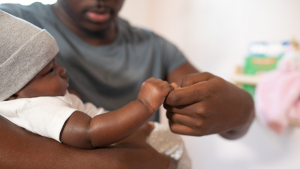
I was checking out the stats on my social media recently and noticed that the percentage of male followers and fathers commenting on my posts has increased. I’m delighted about this. As someone who strives to support the whole family, and also provide information and content that is accessible to everyone, it gladdens my heart to see that number growing.
I’m a die-hard feminist, but that doesn’t mean ignoring other members of the family! Families are dynamic, and we cannot only study the experience of one parent if we want to understand the full picture. Children’s sleep can affect everyone in the family, as well as the complex inter-parental relationships, which in turn affect the child and any siblings. It’s not just the direct overnight care of children that causes fatigue, but the juggling, relationship conflicts, fragmented sleep, and disturbed nights.
We also know that there are an increasing number of fathers who are more actively involved at night, and one of the positive effects is that this seems to benefit maternal and child sleep and wellbeing. So – what I’m trying to say is that fathers matter too.
Sleep affects whole families, yet we often mostly hear about the impact on mothers. This is understandable because to be honest – most of the time this is the reality. A recent systematic review published last year by Coles et al (2022) reviewed studies that explored the relationship between children’s sleep and fathers health and wellbeing. While the review searched for literature about trans fathers and fathers in same sex relationships, there wasn’t any research, so all the studies included in the review were cisgender heterosexual fathers.
The review included 29 studies, and a total sample of more than 14,000 fathers. The studies covered sleep and father’s health and wellbeing in households with children aged from 0-12, and also included children who were disabled, neurodiverse, and had long term health challenges as a result of prematurity.
The pooled findings from the study found that there are several impacts on fathers:
- Dads are tired too – although mothers were more tired
- Some of the studies found that worse sleep was correlated with more depression
- Stress, anxiety and other mental health challenges were more common when children’s sleep was reported to be problematic
- One study found (positively) that when fathers co-slept with their newborns in hospital they felt more closely bonded
- Poor adaptation to co-sleeping was associated to father’s criticism of bedsharing – hinting that perhaps a disagreement about bedsharing was a factor
- More verbal conflict by fathers was seen when fathers were more sleep deprived
- More inter-partner conflict was seen with higher levels of sleep disturbance
What is interesting about the study is that the fathers in this study were all the main wage-earners, and were not primarily the parent caring for their child in the night. But many studies found that fathers were more sleep disturbed at night than mothers realised. It is perhaps an assumption that if fathers are not having to get up to attend to children that their sleep quality is good. While it may be better than mothers, it is clear that the sleep disturbance affects them in multiple ways too – which is relevant both for their mental health but also for family and relationship dynamics and functioning.
What would be great to find out is what would happen if paid work and caring for children was more equally divided? What would happen if parents were better supported in general, with lengthy parental leave and excellent workplace support for expressing or flexible working? The studies so far still explore sleep from the perspective that fathers are the main wage-earner, and mothers are doing most of the work at home. But the reality is that many mothers are also working, and the systems and structures are simply not in place to support parents to care for their children, look after the home, support each other, and earn enough to be comfortable.
The bottom line with all of it is that parents need more support. But it starts with large studies like this, which begin to open a dialogue that demonstrate the wide-reaching changes that having children bring.
All of this isn’t to justify non responsive sleep training by the way – there is no suggestion in the study that what would help is cry it out. It is simply an acknowledgement of how very hard parenting young children is. The take home message for professionals working to support sleep in families is that we should assume that sleep struggles affect fathers’ level of fatigue too, no matter how involved they are at night. We should also assume that the fatigue may have impacts on the parental relationship, and finally that sleep challenges may affect fathers’ mental health. When we know that having an involved father has so many positive impacts on the family dynamic as a whole, it therefore should persuade us to pay more attention to the needs of fathers, signposting them to good father role models and advocates.
So, on that note, here are some of my favourite Fathers resources:
Mark Williams – https://www.markwilliamsfmh.co.uk/
Tom Piccarilli – https://www.thedadvibes.com/
Black Dads Magic – https://podcasts.apple.com/gb/podcast/black-dads-magic/id1519801728
And you can grab a link to the recording of the Dads Summit event I hosted with these fabulous Dads last year here.

Leave A Comment
You must be logged in to post a comment.